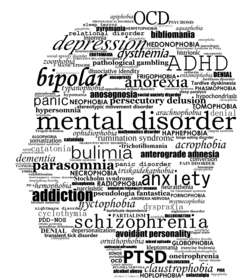Mental health literacy
Mental health literacy has been defined as "knowledge and beliefs about mental disorders which aid their recognition, management or prevention. Mental health literacy includes the ability to recognize specific disorders; knowing how to seek mental health information; knowledge of risk factors and causes, of self-treatments, and of professional help available; and attitudes that promote recognition and appropriate help-seeking".[1] The concept of mental health literacy was derived from health literacy, which aims to increase patient knowledge about physical health, illnesses, and treatments.[2]

Framework
Mental health literacy has three major components: recognition, knowledge, and attitudes. A conceptual framework of mental health literacy illustrates the connections between components, and each is conceptualized as an area to target for measurement or intervention.[2][3][4] While some researchers have focused on a single component, others have focused on multiple and/or the connection between components. For example, a researcher may focus solely on improving recognition of disorders through an education program, whereas another researcher may focus on integrating all three components into one program.
Recognition

Recognition can be broken down into symptom or illness recognition. Symptom recognition is the ability to detect beliefs, behaviors, and other physical manifestations of mental illness, without knowing explicitly which disorder they link to. Specific illness recognition is the ability to identify the presentation of a disorder, such as major depressive disorder.
The recognition of difference between knowledge and attitudes is a crucial part of the mental health literacy framework. While some efforts have focused on promoting knowledge, other researchers have argued that changing attitudes by reducing stigma is a more prolific way of creating meaningful change in mental healthcare utilization. Overall, both approaches have benefits for improving outcomes.[5]
Knowledge
Knowledge is the largest component of mental health literacy, and important topics in Mental Health include:
- How to get information: the networks and systems individuals use to get information about mental disorders. This may include friends, family, educators, or broader sources, such as entertainment or social media.
- Risk factors: what factors put individuals at greatest risk for specific mental health disorders. Risk factors can be unemployment, low income, lack of education, discrimination, and violence.[6]
- Causes of mental disorders
- Self-treatment or self-help: what individuals can do to help themselves recover without consulting with professionals, including the use of self-help books and media. Although many self- treatments are quite ineffective and even harmful due to lack of knowledge.[7]
- Professional help: where to get professional help and/or what professional help is available.
Attitudes
Attitudes are studied in two sub-components: attitudes about mental disorders, or persons with mental disorders, and attitudes about seeking professional help or treatment. Attitudes can vary greatly by individual, and can often be difficult to measure or target with intervention. Nonetheless, a large body of research literature exists on both sub-components, though not always explicitly tied to the mental health literacy.[8]
Recent research recognizes the varying attitudes across mental health professionals towards prognosis, long-term outcomes and likelihood of discrimination as more negative than those of the public. The attitudes of mental health professionals also differ towards interventions, but this variability is usually related to professional orientation.[9]
Public outlook
Surveys of the public have been carried out in a number of countries to investigate mental health literacy.[10][11][12][13][14][15][16] These surveys demonstrate that the recognition of mental disorders is lacking and reveal negative beliefs about some standard psychiatric treatments, particularly medications. On the other hand, psychological, complementary and self-help methods are viewed much more positively. The public tends to prefer self-help and lifestyle interventions, opposed to medical, and psychopharmacological interventions.[9]
Implications surrounding public attitudes towards mental disorders include negative Stereotypes, Prejudice, or Stigma. As a result, this can influence help-seeking behavior or failure to seek treatment.[9] In Canada, a national survey found that young adult males tend to manage their problems individually, and are less likely to seek formal help.[17] Media influence plays a huge role in perpetuating negative mindsets towards mental illness, such as prescribing menacing qualities. A recent study highlights how the majority of participants note the media as the primary source of their beliefs about mental illness being associated with violence, and how this attitude is more prevalent towards serious mental illnesses.[9] Fear and perceptions of danger related to mental illness have increased over the past few decades, largely due to serious mental illness such as schizophrenia being associated as potentially violent and harmful to others.[9] These beliefs and attitudes are potential barriers to seeking individual professional help, and being supportive of others.

Measures
Researchers have measured aspects of mental health literacy in several ways.[4][18] Popular methodologies include vignette studies and achievement tests. Vignette studies measure mental health literacy by providing a brief, detailed story of an individual (or individuals) with a mental health problem, and ask participants questions to identify what problem the individual is experiencing, and at times, additional questions about how the individual can help themselves.[2]
Achievement tests measure mental health literacy on a continuum, such that higher scores on a test indicate greater overall knowledge or understanding of a concept. Achievement tests can be formatted using multiple-choice, true/false, or other quantitative scales.
Various scales have been created to measure the various components of mental health literacy, though not all are validated.[4][18] Mental health literacy has been measured across several populations, varying in age range, culture, and profession. Most studies have focused on adult and young adult populations, though improving literacy in children has been a focus of prevention efforts.
Limitations

Low literacy within a population is a relevant concern, since at the most basic level, mental health literacy is linked to general literacy. Without this foundation, the beneficial effects of mental health literacy are challenging for those who face difficulties with reading and writing.[9] Increased measures to increase literacy rates must be employed to empower and encourage the self-help components of mental health literacy.
Populations can be diverse, which means barriers, such as cultural and social contexts, must be addressed. Within and across cultures, social, economic and political factors profoundly influence mental health. There are numerous socioeconomic and environmental determinants of mental health and mental illness, just as there are for physical health and physical illness.[9] Social determinants of physical health including poverty, education and social support also serve as influencers.[9] In order to encompass mental health literacy and diverse perspectives, further research in these areas are needed.
Recognizing uncommon mental disorders is another hurdle that can disrupt mental health literacy within the public. Recent research shows that most studies are limited to identifying depression, generalized anxiety, and schizophrenia. In a recent Canadian study, most participants demonstrated good mental health literacy in regards to most mental health disorders, but a poor understanding of panic disorder.[19] An increased awareness surrounding underrepresented or more uncommon mental disorders is needed to widen public knowledge.
A concluding limitation is the lack of research on child mental health literacy, as the majority of studies focus on adults and adolescents. If caregivers are not educated on recognizing and supporting mental disorders, this could create confusion and result in delayed treatment or wrongful prognosis for dependents. A child mental health literacy (CMHL) initiative could be implemented to target all adults in the general population, as well as parents, teachers, health professionals and/or children themselves.[20]
Improvement approaches
A number of approaches have been tried and suggested to improve mental health literacy, many of which have evidence of effectiveness. These include:
- Whole of community campaigns. Examples are beyondblue[21] and the Compass Strategy[22] in Australia, the Defeat Depression Campaign[23] in the United Kingdom, and the Nuremberg Alliance Against Depression[24] in Germany.
- School-based interventions. These include MindMatters[25] and Mental Illness Education[26] in Australia, and the Mental Health & High School Curriculum Guide in Canada[27]
- Individual training programs. These include mental health first aid training[28] and training in suicide prevention skills.[29] Initiatives that encourage empowerment and choice would also be beneficial, such as web-based self-directed therapy.[9]
- Websites and books aimed at the public. There is evidence that both websites and books can improve mental health literacy.[30][31] However, the quality of information on websites can sometimes be low.[32]
- Rapport between mental health professionals and clients. By creating a partnership, professionals can promote competence, informed choice, and comprehensible knowledge for all levels of understanding, such as translating research findings into simpler language.[9]
Notes and references
- Jorm, A.F.; Korten, A.E.; Jacomb, P.A.; Christensen, H.; Rodgers, B.; Pollitt, P. (1997). ""Mental health literacy": a survey of the public's ability to recognise mental disorders and their beliefs about the effectiveness of treatment". Medical Journal of Australia. 166 (4): 182–186. doi:10.5694/j.1326-5377.1997.tb140071.x.
- Jorm, Anthony F.; Korten, Ailsa E.; Jacomb, Patricia A.; Christensen, Helen; Rodgers, Bryan; Pollitt, Penelope (1997-01-01). "Mental health literacy: a survey of the public's ability to recognise mental disorders and their beliefs about the effectiveness of treatment". Medical Journal of Australia. 166 (4): 182–186. doi:10.5694/j.1326-5377.1997.tb140071.x. ISSN 0025-729X.
- Jorm, Anthony F. (2000). "Mental health literacy: Public knowledge and beliefs about mental disorders" (PDF). British Journal of Psychiatry. 177 (5): 396–401. doi:10.1192/bjp.177.5.396. PMID 11059991.
- O'Connor, Matt; Casey, Leanne; Clough, Bonnie (2014-08-01). "Measuring mental health literacy – a review of scale-based measures". Journal of Mental Health. 23 (4): 197–204. doi:10.3109/09638237.2014.910646. hdl:10072/61844. ISSN 0963-8237. PMID 24785120.
- Corrigan, Patrick W.; Morris, Scott B.; Michaels, Patrick J.; Rafacz, Jennifer D.; Rüsch, Nicolas (2012). "Challenging the Public Stigma of Mental Illness: A Meta-Analysis of Outcome Studies". Psychiatric Services. 63 (10): 963–973. doi:10.1176/appi.ps.201100529. PMID 23032675.
- McDowell, Michal J.; Hughto, Jaclyn M. W.; Reisner, Sari L. (December 2019). "Risk and protective factors for mental health morbidity in a community sample of female-to-male trans-masculine adults". BMC Psychiatry. 19 (1): 16. doi:10.1186/s12888-018-2008-0. ISSN 1471-244X. PMC 6327526. PMID 30626372.
- Guy, Sarah; Sterling, Bobbie Sue; Walker, Lorraine O.; Harrison, Tracie C. (2014). "Mental Health Literacy and Postpartum Depression: A Qualitative Description of Views of Lower Income Women". Archives of Psychiatric Nursing. 28 (4): 256–262. doi:10.1016/j.apnu.2014.04.001. PMID 25017559.
- Guy, Sarah; Sterling, Bobbie Sue; Walker, Lorraine O.; Harrison, Tracie C. (2014). "Mental Health Literacy and Postpartum Depression: A Qualitative Description of Views of Lower Income Women". Archives of Psychiatric Nursing. 28 (4): 256–262. doi:10.1016/j.apnu.2014.04.001. PMID 25017559.
- Canadian Alliance on Mental Illness and Mental Health, "Mental health literacy", 2007
- Angermeyer, M.C.; Matschinger, H. (2005). "Have there been any changes in the public's attitudes towards psychiatric treatment? Results from representative population surveys in Germany in the years 1990 and 2001". Acta Psychiatrica Scandinavica. 111 (1): 68–73. doi:10.1111/j.1600-0447.2004.00441.x. PMID 15636596.
- Jorm, A.F., Nakane, Y., Christensen, H., Yoshioka, K., Griffiths, K.M. & Wata, Y. (2005). Public beliefs about treatment and outcome of mental disorders: a comparison of Australia and Japan. BMC Medicine, 3, 12.

- Jorm, A.F., Angermeyer, M. & Katschnig, H. (2000). Public knowledge of and attitudes to mental disorders: A limiting factor in the optimal use of treatment services. In G. Andrews & A.S. Henderson (Eds.) Unmet Need in Psychiatry. (pp. 399-413). Cambridge: Cambridge University Press.
- Lauber, C.; Nordt, C.; Falcato, L.; Rössler, W. (2003). "Do people recognise mental illness? Factors influencing mental health literacy". European Archives of Psychiatry and Clinical Neuroscience. 253 (5): 248–251. doi:10.1007/s00406-003-0439-0. PMID 14504994.
- Magliano, L.; Fiorillo, A.; De Rosa, C.; Malangone, C.; Maj, M. (2004). "Beliefs about schizophrenia in Italy: A comparative nationwide survey of the general public, mental health professionals, and patients' relatives". Canadian Journal of Psychiatry. 49 (5): 322–330. doi:10.1177/070674370404900508.
- Wang, J.L.; Adair, C.; Fick, G.; Lai, D.; Evans, B.; Perry, B.W.; Jorm, A.; Addington, D. (2007). "Depression literacy in Alberta: Findings from a general population sample". Canadian Journal of Psychiatry. 52 (7): 442–449. doi:10.1177/070674370705200706. PMID 17688008.
- Marie, D., Forsyth, D. & Miles, L.K. (2004). Categorical ethnicity and mental health literacy in New Zealand. Ethnicity and Health, 9(3), 225-252.
- Marcus, Madalyn; Westra, Henny (April 2012). "Mental Health Literacy in Canadian Young Adults: Results of a National Survey". Canadian Journal of Community Mental Health. 31 (1): 1–15. doi:10.7870/cjcmh-2012-0002. ISSN 0713-3936.
- Wei, Yifeng; McGrath, Patrick J.; Hayden, Jill; Kutcher, Stan (2015-01-01). "Mental health literacy measures evaluating knowledge, attitudes and help-seeking: a scoping review". BMC Psychiatry. 15: 291. doi:10.1186/s12888-015-0681-9. ISSN 1471-244X. PMC 4650294. PMID 26576680.
- Catherine E. Gallagher & Margo C. Watt, "Mental Health Literacy in a Sample of Canadian Adults", 2019
- Lucy A Tully , David J Hawes, Frances L Doyle , Michael G Sawyer, and Mark R Dadds, "A national child mental health literacy initiative is needed to reduce childhood mental health disorders", 2019
- Jorm, A.F.; Christensen, H.; Griffiths, K.M. (2005). "The impact of beyondblue: the national depression initiative on the Australian public's recognition of depression and beliefs about treatments". Australian and New Zealand Journal of Psychiatry. 39 (4): 248–254. doi:10.1080/j.1440-1614.2005.01561.x. PMID 15777361.
- Wright, A.; McGorry, P.D.; Harris, M.G.; Jorm, A.F.; Pennell, K. (2006). "Development and evaluation of a youth mental health community awareness campaign: The Compass Strategy". BMC Public Health. 6: 215. doi:10.1186/1471-2458-6-215. PMC 1564138. PMID 16923195.
- Paykel, E.S.; Hart, D.; Priest, R.G. (1998). "Changes in public attitudes to depression during the Defeat Depression Campaign". British Journal of Psychiatry. 173 (6): 519–522. doi:10.1192/bjp.173.6.519. PMID 9926082.
- Hegerl, U.; Althaus, D.; Stefanek, J. (2003). "Public attitudes towards treatment of depression: Effects of an information campaign". Pharmacopsychiatry. 36 (6): 288–291. doi:10.1055/s-2003-45115. PMID 14663652.
- MindMatters Evaluation Consortium (2000). Report of the MindMatters (National Mental Health in Schools Project) Evaluation Project, vols 1-4. Newcastle: Hunter Institute of Mental Health.
- Rickwood, D.; Cavanagh, S.; Curtis, L.; Sakrouge, R. (2004). "Educating young people about mental health and illness: Evaluating a school-based programme". International Journal of Health Promotion. 6 (4): 23–32. doi:10.1080/14623730.2004.9721941.
- Kutcher, S.; Wei, Y.; McLuckie, A.; Bullock, L. (2013). "Educator mental health literacy: a programme evaluation of the teacher training education on the mental health & high school curriculum guide". Advances in School Mental Health Promotion. 6 (2): 83–92. doi:10.1080/1754730X.2013.784615.
- Kitchener, B.A.; Jorm, A.F. (2006). "Mental Health First Aid training: review of evaluation studies". Australian and New Zealand Journal of Psychiatry. 40 (1): 6–8. doi:10.1080/j.1440-1614.2006.01735.x. PMID 16403032.
- Pearce, K., Rickwood, D. & Beaton, S. (2003). Preliminary evaluation of a university-based suicide intervention project: Impact on participants. Australian e-Journal for the Advancement of Mental Health, 2, www.auseinet.com/journal/vol2iss1/Pearce.pdf.
- Christensen, H.; Griffiths, K.M.; Jorm, A.F. (2004). "Delivering interventions for depression by using the internet: randomised controlled trial". British Medical Journal. 328 (7434): 265. doi:10.1136/bmj.37945.566632.ee. PMC 324455. PMID 14742346.
- Jorm, A.F.; Griffiths, K.M.; Christensen, H.; Korten, A.E.; Parslow, R.A.; Rodgers, B. (2003). "Providing information about the effectiveness of treatment options to depressed people in the community: A randomized controlled trial of effects on mental health literacy, help-seeking and symptoms". Psychological Medicine. 33 (6): 1071–1087. doi:10.1017/s0033291703008079. PMID 12946091.
- Griffiths, K.M.; Christensen, H. (2002). "The quality and accessibility of Australian depression sites on the World Wide Web". Medical Journal of Australia. 176 (10): S97–S104. doi:10.5694/j.1326-5377.2002.tb04509.x.